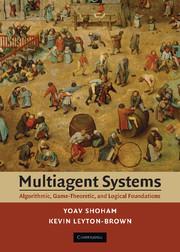Book contents
- Frontmatter
- Contents
- Credits and Acknowledgments
- Introduction
- 1 Distributed Constraint Satisfaction
- 2 Distributed Optimization
- 3 Introduction to Noncooperative Game Theory: Games in Normal Form
- 4 Computing Solution Concepts of Normal-Form Games
- 5 Games with Sequential Actions: Reasoning and Computing with the Extensive Form
- 6 Richer Representations: Beyond the Normal and Extensive Forms
- 7 Learning and Teaching
- 8 Communication
- 9 Aggregating Preferences: Social Choice
- 10 Protocols for Strategic Agents: Mechanism Design
- 11 Protocols for Multiagent Resource Allocation: Auctions
- 12 Teams of Selfish Agents: An Introduction to Coalitional Game Theory
- 13 Logics of Knowledge and Belief
- 14 Beyond Belief: Probability, Dynamics, and Intention
- Appendices: Technical Background
- Bibliography
- Index
2 - Distributed Optimization
Published online by Cambridge University Press: 05 June 2012
- Frontmatter
- Contents
- Credits and Acknowledgments
- Introduction
- 1 Distributed Constraint Satisfaction
- 2 Distributed Optimization
- 3 Introduction to Noncooperative Game Theory: Games in Normal Form
- 4 Computing Solution Concepts of Normal-Form Games
- 5 Games with Sequential Actions: Reasoning and Computing with the Extensive Form
- 6 Richer Representations: Beyond the Normal and Extensive Forms
- 7 Learning and Teaching
- 8 Communication
- 9 Aggregating Preferences: Social Choice
- 10 Protocols for Strategic Agents: Mechanism Design
- 11 Protocols for Multiagent Resource Allocation: Auctions
- 12 Teams of Selfish Agents: An Introduction to Coalitional Game Theory
- 13 Logics of Knowledge and Belief
- 14 Beyond Belief: Probability, Dynamics, and Intention
- Appendices: Technical Background
- Bibliography
- Index
Summary
In the previous chapter we looked at distributed ways of meeting global constraints. Here we up the ante; we ask how agents can, in a distributed fashion, optimize a global objective function. Specifically, we consider four families of techniques and associated sample problems. They are, in order:
distributed dynamic programming (as applied to path-planning problems);
distributed solutions to Markov Decision Problems (MDPs);
optimization algorithms with an economic flavor (as applied to matching and scheduling problems); and
coordination via social laws and conventions, and the example of traffic rules.
Distributed dynamic programming for path planning
Like graph coloring, path planning constitutes another common abstract problemsolving framework. A path-planning problem consists of a weighted directed graph with a set of n nodes N, directed links L, a weight function w : L ↦ ℝ+, and two nodes s, t ∈ N. The goal is to find a directed path from s to t having minimal total weight. More generally, we consider a set of goal nodes T ⊂ N, and are interested in the shortest path from s to any of the goal nodes t ∈ T.
This abstract framework applies in many domains. Certainly it applies when there is some concrete network at hand (e.g., a transportation or telecommunication network). But it also applies in more roundabout ways.
- Type
- Chapter
- Information
- Multiagent SystemsAlgorithmic, Game-Theoretic, and Logical Foundations, pp. 19 - 46Publisher: Cambridge University PressPrint publication year: 2008



